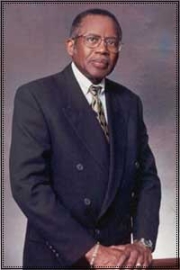 Noted Civil Rights attorney and minister Fred Gray will appear on Belmont’s campus on Wed., Jan. 20 for a special forum and lecture. Gray—the former attorney for Rosa Parks, Rev. Martin Luther King, Jr. and the Tuskegee Syphilis Study victims—will discuss “Lessons Learned from a Civil Rights Pioneer about Health, Social Justice and Christian Service.” This morning-long event is free and open to the public, courtesy of financial assistance provided by the Jacob G. Schmidlapp Trusts, Fifth Third Bank, Trustee. Both the forum and the lecture will take place in Belmont’s Massey Performing Arts Center.
Noted Civil Rights attorney and minister Fred Gray will appear on Belmont’s campus on Wed., Jan. 20 for a special forum and lecture. Gray—the former attorney for Rosa Parks, Rev. Martin Luther King, Jr. and the Tuskegee Syphilis Study victims—will discuss “Lessons Learned from a Civil Rights Pioneer about Health, Social Justice and Christian Service.” This morning-long event is free and open to the public, courtesy of financial assistance provided by the Jacob G. Schmidlapp Trusts, Fifth Third Bank, Trustee. Both the forum and the lecture will take place in Belmont’s Massey Performing Arts Center.
Belmont President Dr. Bob Fisher said, “It’s a distinct honor to welcome Fred Gray to Belmont’s campus, especially during the week when our nation celebrates the accomplishments of Rev. Martin Luther King, Jr. and the Civil Rights movement. At Belmont we encourage our students to use their gifts and talents to impact the world. There are few better examples of individuals who have accomplished that mission than Fred Gray.”
The event will begin with an 8:30 a.m. panel discussion featuring Gray along with the following special guests:
• Dr. Henry Foster, Jr., professor emeritus and former dean of the Meharry College School of Medicine and nominee for U.S. Surgeon General under President Bill Clinton
• Dwight Lewis, columnist and member of the editorial board for The Tennessean
• John Seigenthaler, founding editorial director of USA Today, founder of the First Amendment Center and award-winning journalist who briefly left his career in the 1960s to work in the civil rights field.
Following a 20-minute intermission at the conclusion of the panel forum, Gray will return for a keynote lecture at 10 a.m. His presentation will conclude with a question-and-answer session.
Gray’s legal career began in the midst of America’s modern day civil rights movement. With a quiet demeanor, strong determination and secret commitment made in college, he vowed, “to become a lawyer, return to Alabama, and destroy everything segregated I could find.” Gray began his legal career as a sole practitioner, less than a year out of law school, and at age 24, he represented Mrs. Rosa Parks who refused to give up her seat to a white man on a city bus, the action that initiated the Montgomery Bus Boycott. Gray was also Dr. Martin Luther King, Jr.’s first civil rights lawyer. This was the beginning of a legal career that now spans more than 45 years.
In the early 1970s, Gray represented the victims of the Tuskegee Syphilis Study. For 40 years the U.S. Public Health Service had conducted an experiment on hundreds of black men in the late stages of syphilis, withholding information and treatment for the condition for more than 300 men in the control group. In 1974, Gray filed a class action suit that provided a $10 million out-of-court settlement for those men and their families, and it was Gray who later encouraged President Bill Clinton to issue an apology to the victims on behalf of the U.S. government in 1997.
Gray has been at the forefront of changing the social fabric of America regarding desegregation, integration, constitutional law, racial discrimination in voting, housing, education, jury service, farm subsidies, medicine and ethics, and generally in improving the national judicial system.
Gray was born in Montgomery, Alabama, and is a graduate of the Nashville Christian Institute, Alabama State University and Case Western Reserve University. Currently, he is senior partner at the law firm of Gray, Langford, Sapp, McGowan, Gray & Nathanson, which has law offices in Tuskegee and Montgomery, Alabama. He served as president of the Alabama State Bar Association in 2002-03, the first African-American to hold the position.
Presented by Belmont’s Gordon E. Inman College of Health Sciences and Nursing “Diagnosing Our Future” speaker series, Fred Gray’s appearance is also co-sponsored by Belmont’s College of Law, the Office of Spiritual Development and the Center for Community Health and Health Equity.
